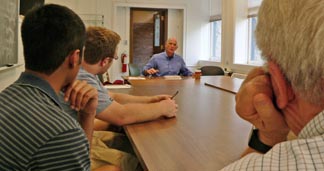Race, creationism, stem cells: Cornell Bioethics Society tackles tough ethical issues every week
By Krishna Ramanujan

Syphilis. Race. Treating patients as objects. These charged issues are at the center of an award-winning play, "Miss Evers' Boys," by David Feldshuh, a physician and Cornell University theater professor. The themes were also apt subjects for Feldshuh's talk Sept. 19 at a weekly meeting of the Bioethics Society of Cornell.
Feldshuh, who also serves as artistic director of Cornell's Schwartz Center for the Performing Arts, discussed his Emmy award-winning, Pulitzer prize-nominated play, which explores moral issues related to a 40-year U.S. government syphilis study in Tuskegee, Ala., that left poor black syphilis patients untreated so that doctors could view a natural history of the disease and see whether whites and blacks responded differently. Between 1932 and 1972, the 600 subjects complied because they were falsely told they were being treated.
"There was no shame about this study," said Feldshuh.
Issues that cross between ethics and the biosciences are regular fare at the Bioethics Society's weekly Monday afternoon meetings at Stimson Hall. Three weeks previously, William Provine, professor of ecology and evolutionary biology at Cornell, had discussed the debate over evolution and intelligent design. An updated version of creationism, intelligent design argues that life on Earth and its relationships are too complex to be explained by evolution, so a creator or designer with a plan must be coordinating things.
Other topics in the past have ranged from debates over stem cells and cloning to topics in the news, such as genetic modifications to life forms.
"The whole purpose of these meetings is to raise awareness and discuss issues that pertain to people who are going into biology in the future," said Matt Wong, a senior biology major who is now in his second year as president of the society. "The meetings ask some very fundamental questions: What does it mean to be human? What does it mean to be a good person and a member of society? What would it mean to be a good physician or a responsible researcher?"
Biology and premed majors make up the majority of the audience each week, though a few pre-law students also attend, said Wong. The main goal is education on relevant science issues.
"Everyone who comes to our meetings walks out at least knowing more about the issues," said Wong. "When they leave, at least they know how to carry on a conversation about difficult topics, such as the ones we've covered."
Feldshuh's talk explored ways in which doctors fail to identify with their patients in an attempt to remain objective. He cited a study that suggests that some choices, such as the different treatment of pain in white and minority patients, may be the result of unconscious choices in caregivers.
"If you are very different from the person you are experimenting on, if you are intellectually curious about the outcome of your experiment, if you have more power than the subjects of the experiment, if you have more education, if you are of a different class, then you should take a deep breath and ask yourself if you are getting yourself into something that you shouldn't be getting into," Feldshuh said. "Miss Evers' Boys," he said, was a cautionary tale about the power of government to conduct such experiments.
The play, which opened in 1989, was made into an HBO movie in 1996 that was seen by 30 million viewers. The movie influenced a formal 1997 government apology by President Bill Clinton to the Tuskegee survivors.
The Bioethics Society of Cornell meets in 119 Stimson Hall every Monday at 4:45 p.m. and is attended by faculty adviser the Rev. Robert S. Smith, Catholic chaplain for Cornell United Religious Work. Meetings are open to the public.
Media Contact
Get Cornell news delivered right to your inbox.
Subscribe